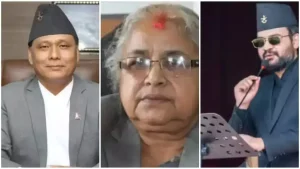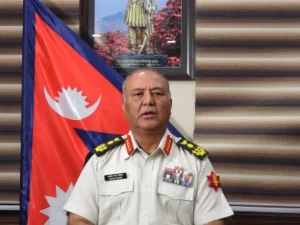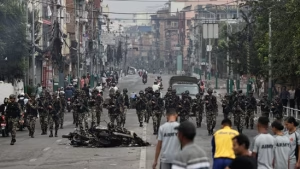Nepal – Nepal’s President Ram Chandra Paudel has issued a formal appeal to citizens as the Nepal interim PM selection process intensifies through extended negotiations with Gen Z representatives and military leadership. The ceremonial head of state emphasized his commitment to resolving the current political crisis within constitutional boundaries while protecting democratic institutions.
In a letter dated September 11, President Paudel stated, “I am deliberating and making every effort to find a way out of the current difficult situation in the country within the constitutional framework and to protect democracy.” This communication underscores the gravity of the Nepal interim PM selection process following violent protests that led to government overthrow.
High-Level Negotiations Between Multiple Stakeholders

The Nepal interim PM selection involves complex trilateral discussions between President Paudel, Gen Z protest representatives, and Army Chief Ashok Raj Sigdel. These negotiations represent an unprecedented political arrangement where youth protesters hold significant influence in determining national executive leadership.
Sources familiar with the discussions indicate that both the President and army leadership have placed responsibility for final candidate selection on Gen Z representatives. This arrangement ensures that the Nepal interim PM selection reflects the demands of the protest movement while maintaining institutional legitimacy through constitutional processes.
The strategic positioning of responsibility on Gen Z leaders prevents future accusations against the President and military regarding the selection outcome, creating accountability for the youth movement in the Nepal interim PM selection process.
Extended Negotiations Yield Multiple Candidates
Thursday’s discussions continued the Nepal interim PM selection deliberations that began earlier in the week, with numerous potential candidates under consideration. Dozens of young protesters gathered outside army headquarters, eagerly awaiting decisions as the critical meetings progressed.
Previous Wednesday meetings had also failed to reach consensus, despite reports suggesting former Chief Justice Sushila Karki as a leading candidate. The Nepal interim PM selection considerations later expanded to include Kulman Ghising, former chief of the Nepal power board, demonstrating the broad search for acceptable leadership.
Current candidates in the Nepal interim PM selection process include Kathmandu Mayor Balendra Shah alongside the previously mentioned Sushila Karki and Kulman Ghising, indicating diverse professional backgrounds being considered for interim executive leadership.
Constitutional Framework Guides Selection Process
President Paudel’s commitment to working within constitutional parameters shapes the Nepal interim PM selection methodology, ensuring democratic legitimacy despite the unprecedented circumstances. The President’s appeal emphasized confidence that solutions addressing agitating citizens’ demands would be found promptly through proper legal channels.
The Nepal interim PM selection must balance revolutionary demands with institutional continuity, requiring careful navigation of constitutional requirements while satisfying protest movement expectations. This delicate balance defines the current political transition process.
Constitutional adherence in the Nepal interim PM selection demonstrates Nepal’s commitment to democratic principles even during periods of significant political upheaval and social transformation.
Military’s Facilitative Role in Political Transition


Army Chief Ashok Raj Sigdel’s participation in the Nepal interim PM selection discussions reflects the military’s stabilizing role during the political transition. An army spokesperson confirmed ongoing stakeholder consultations while emphasizing focus on resolving the current stalemate and maintaining law and order.
The military’s involvement in the Nepal interim PM selection process serves to ensure national security while facilitating peaceful political transition. This approach contrasts with military interventions in other contexts by supporting rather than supplanting civilian democratic processes.
Also Read: Devastating Kathmandu Hilton Hotel Fire Destroys Nepal’s Tallest Building During Protests
Military facilitation of the Nepal interim PM selection provides institutional stability during uncertain times while respecting civilian authority and democratic governance principles.
Replacement of KP Sharma Oli Government
The Nepal interim PM selection follows KP Sharma Oli’s resignation on Tuesday after violent student-led protests forced his government’s collapse. The interim leader will serve until fresh elections can be organized within a constitutionally specified timeframe.
This transition represents a complete change in Nepal’s executive leadership through popular pressure, making the Nepal interim PM selection crucial for national stability and democratic continuity. The new leader must navigate complex political circumstances while preparing for eventual electoral democracy restoration.
Ongoing Democratic Protection Efforts
Small groups of students from major political parties continue demonstrating in parts of Kathmandu, demanding constitutional preservation and democracy protection during the government formation process. These demonstrations reflect broader concerns about maintaining democratic institutions throughout the Nepal interim PM selection and subsequent transition period.
The emphasis on constitutional adherence and democratic protection indicates that the Nepal interim PM selection occurs within a framework of institutional respect despite revolutionary origins. This approach suggests commitment to democratic governance beyond immediate political changes.
Curfew Implementation and Security Measures

Military authorities have imposed curfews in Kathmandu to restore order following what observers describe as the worst violence in two decades. The security measures aim to create stable conditions for the Nepal interim PM selection while protecting public safety and institutional infrastructure.
The combination of security enforcement and political negotiations demonstrates Nepal’s effort to balance order maintenance with democratic transition processes during this critical period.


